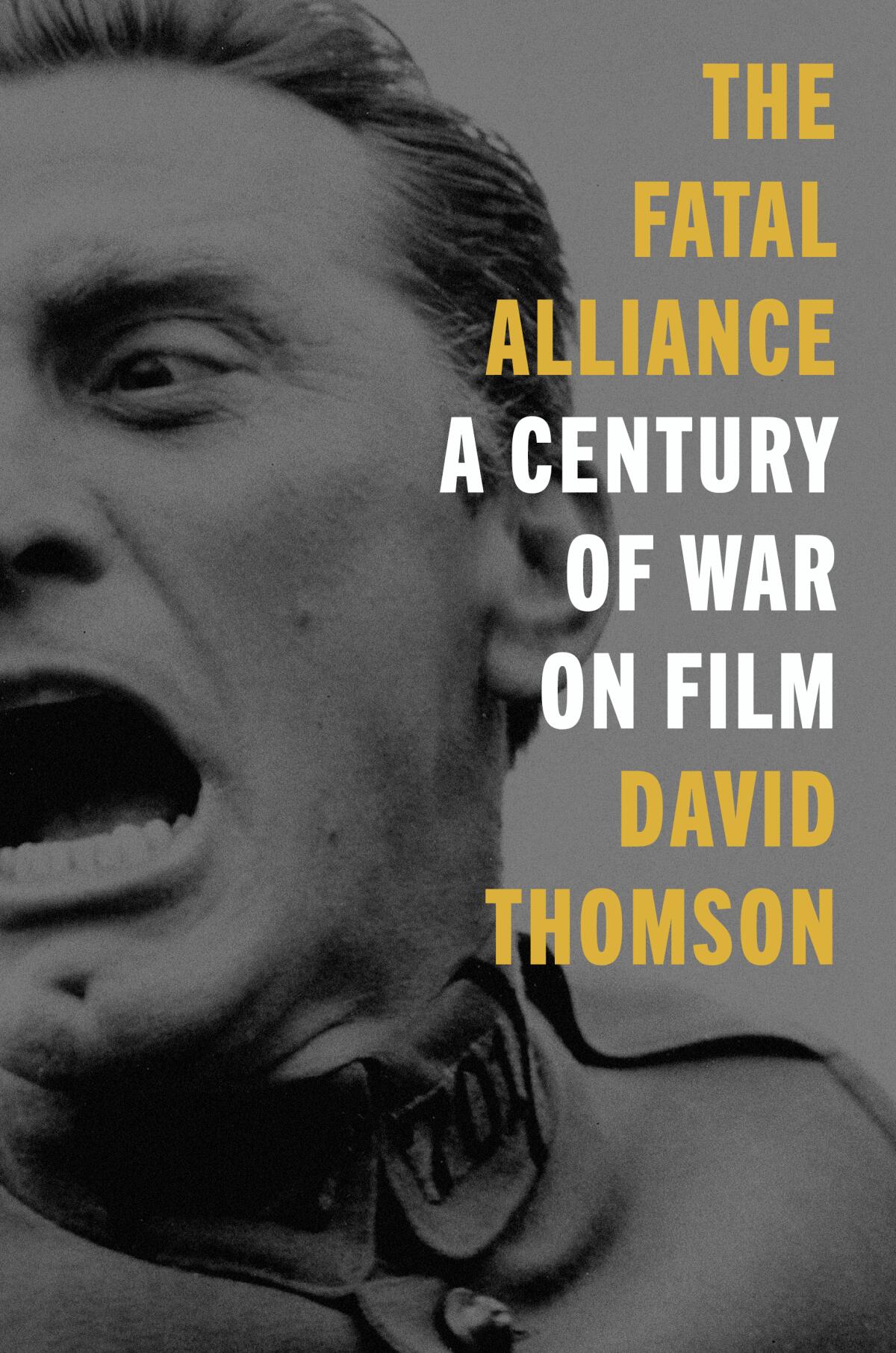Overview
The Deadly Alliance: A Century of Warfare on Movie
By David Thomson
Harper: 448 pages, $35
When you purchase books linked on our web site, The Occasions could earn a fee from Bookshop.org, whose charges assist impartial bookstores.
“I doubt there may be any such factor as an antiwar movie,” veteran film critic David Thomson writes in his new survey of warfare films, “The Deadly Alliance.” “In the dead of night, regardless of the official motive or the orders, we go to warfare for pleasure.”
These are combating phrases, however they’re value debating — particularly now, because the headlines reveal how badly the antiwar facet is doing. So most of the warfare films we most admire pay lip service to the notion that warfare is abominable and to be averted, however solely whereas delivering the joys of witnessing fight.
The opening D-day sequence of “Saving Non-public Ryan” and the climactic mad sprint of “1917” are rightly praised for his or her authentically rendered brutality. However the chaos is usually half of a bigger narrative designed to offer reassurance that warfare delivers victory and a way of order: The soldier is rescued, the battlefield directive is efficiently fulfilled. In that mild, these “gritty” and “genuine” warfare movies could also be extra of a responsible pleasure than any MCU spectacle.
This paradox is Thomson’s central concern all through the e book, however that doesn’t imply “The Deadly Alliance” is a book-length guilt journey. Thomson deeply admires many entries within the style — he notes he’s watched “Black Hawk Down” six occasions — and has a eager eye for moments that undermine its extra propagandistic conventions. However he’s additionally persistently, thoughtfully questioning what filmmakers intend, what conversations they’re by chance moving into and the way we as moviegoers are implicated as war-story customers.

David Thomson, a veteran movie critic, sees warfare movies as an advanced style in “The Deadly Alliance.”
(David Thomson)
Thomson is exceedingly well-equipped for the job: Since 1975, he has been publishing and updating his important “Biographical Dictionary of Movie,” which is thick with pungent, opinionated surveys of filmmakers and actors. (Its newest version, the sixth, was printed in 2014.) And he’s lengthy been mulling questions of what warfare films inform us, or withhold. There’s a high quality essay on warfare films in his 2012 e book, “The Large Display,” as an illustration, considering how they ratify historical past, obscure the worst carnage and function imperfect metaphors “for uncertainty and dysfunction.”
Thomson’s organizing precept in “The Deadly Alliance” is chronological, beginning with movies made throughout and about World Warfare I and ending within the current day. Virtually instantly, he notes, Hollywood discovered a profitable formulation for the warfare movie: Mix fight and romance. Charlie Chaplin’s 1918 brief “Shoulder Arms” featured a careless doughboy rescuing a French woman whereas on a secret mission; King Vidor’s 1925 epic “The Large Parade” braided battle scenes and courtship rituals.
“A style was established,” Thomson notes, however at a value. Chaplin’s bumbling humor helped create a “public [that] beheld the catastrophe with a relative tranquility that we now discover exhausting to know or forgive.”
Thomson does establish films that unsettle this sense of consolation, similar to Stanley Kubrick’s “Paths of Glory,” a savage critique of the officer class, or Terence Malick’s “The Skinny Purple Line,” which makes warfare into an abstraction of worry and uncertainty, or Gillo Pontecorvo’s “Battle of Algiers,” nonetheless the standard-bearer for movies about anti-colonial resistance since its launch in 1966.
Even in these instances, nevertheless, warfare films extra normally characterize historical past as written by the winners. “Numerous warfare movies have an imprimatur whereby the result of the warfare is bolstered by the stance of justice we now have picked up, allied to a sense that the establishment of cinema stands agency behind the which means of the story,” Thomson writes. Which is a great distance of claiming that warfare films are, once you come all the way down to it, propaganda.

Although “The Deadly Alliance” has an arc and a central argument, it’s not as user-friendly a style survey as a moviegoer may hope for. No one involves Thomson for cozy listicles of “high 5 problematic Vietnam films.” However his career-long dedication to writing pithy biographical encyclopedia entries means the e book appears to leap habitually from movie to movie with out filling out its assertions. No sooner has he referred to as out the refined provocations of “The Life and Loss of life of Colonel Blimp” or “Gallipoli” than he’s off to go to Non-public Ryan, the River Kwai and a dozen extra less-familiar warfare tales.
When he slows down, although, “The Deadly Alliance” will be bracing and stunning. The e book’s greatest chapter is a extra affected person meditation on Mel Gibson, Thomson’s (nicely, everybody’s) sophisticated relationship together with his work, and the way movies like “Braveheart” and “Apocalypto” crystalize the warfare film’s contradictions and risks: “That is Trumpian cinema, and you’ll really feel his contempt for us and shudder on the energy it might attain.”
The deepest hassle with warfare films, Thomson suggests, is that they warp how we expertise and perceive the actual factor. What will we miss, or misunderstand, after we take a look at Gaza or Ukraine by the filters taught to us from warfare films, with their straightforward platitudes about valor and patriotism? What sorts of heroism are we pining for, and does that urge come on the expense of seeing warfare’s important chaos plainly?
“The artifice and corruption of the flicks has compromised the plain depth of warfare,” Thomson writes. “The Deadly Alliance” is unlikely to remodel our urge for food for the joys of warfare films; let’s hope, in any case, it should make us somewhat extra uncomfortable in our seats.
Athitakis is a author in Phoenix and the creator of “The New Midwest.”
#David #Thomsons #e book #warfare #films #Deadly #Alliance
